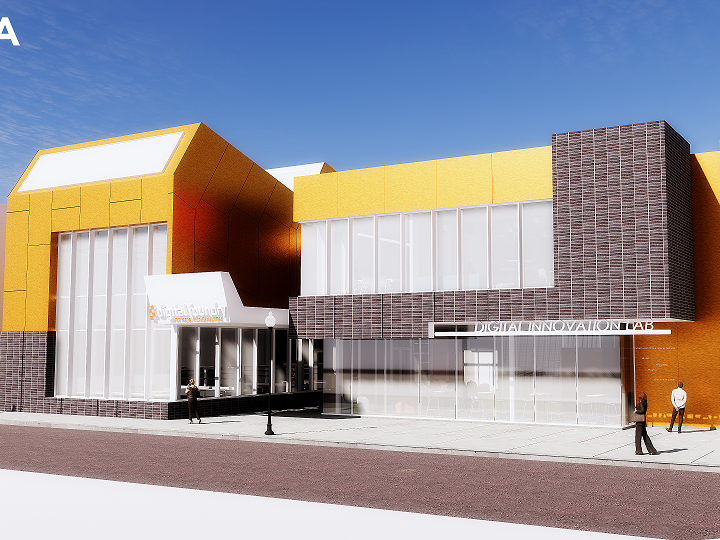A modern manufacturing organization outside of Pittsburgh just earned more recognition from the federal government.
Digital Foundry at New Kensington was named as one of four new smart manufacturing innovation centers by the US Department of Energy this week in partnership with CESMII — The Smart Manufacturing Institute.
A collaboration of Penn State University‘s New Kensington campus and the Economic Growth Connection of Westmoreland County, the Digital Foundry was launched in 2020 with $5.5 million in support from the Richard King Mellon Foundation. The early efforts of the organization will culminate in the opening of its 15,044-square-foot innovation and manufacturing lab space later this spring.
Digital Foundry’s leaders all come from experiences in the manufacturing industry themselves, and that’s what makes its approach to industry transformation so unique, Executive Director Sherri McCleary told Technical.ly.
“We’re approaching this very much from the perspective of understanding business and industry needs, and our mission is focused on three primary things,” she said. “The first is workforce development in advanced digital technologies or smart manufacturing. The second is bringing technology access and demonstration to local manufacturing businesses where they can come in and learn about the technologies and understand how it applies to them and what the business value could be. And the third is general networking and awareness events.”
Digital Foundry’s been working toward accomplishing all of that ahead of the center’s opening in about a month. McCleary shared that the organization’s been focused on launching some of its workforce training initiatives, funded in part by a $1.5 million federal Workforce Opportunity for Rural Communities Initiative grant it received last fall. The Growing and Reskilling Our Workforce in Pennsylvania project — aka GROW PA — that came out of that funding focuses on improving site readiness through access to credentialing programs, work readiness through training programs for all skill levels and operation readiness to connect those in each program to employment opportunities. McCleary added that Digital Foundry has also been collaborating with Penn State New Kensington’s ABC Create program to improve STEM education and exposure for K-12 students.
If this approach to revitalizing manufacturing in a Rust Belt community works, McCleary hopes that CESMII can help take Digital Foundry's ideas beyond southwestern Pennsylvania.
This new recognition from the Department of Energy puts Digital Foundry among a total of only seven smart manufacturing innovation centers officially recognized by the federal government.
“Our approach is very focused on specifically what CESMII is all about, which is smart connected systems,” McCleary said of the federal government-funded nonprofit. “How do you use smart sensors, gather data, better understand your operations to manage efficiencies, energy, utilization, costs, quality — all of those things can be enhanced when you better understand what’s really happening in your operations.” She added that Digital Foundry’s focus on small to medium-size manufacturing businesses also appeals to CESMII, as the hope is to provide those companies with the kind of resources that larger corporations already have.
If this approach to revitalizing manufacturing in a Rust Belt community works, McCleary hopes that CESMII can help take Digital Foundry’s ideas beyond southwestern Pennsylvania.
“It gives us some recognition not just kind of regionally but nationally, because we can kind of co-brand and co-market some of the things we’re doing around workforce training and those sorts of things.”
While the priority right now is finalizing the Digital Foundry building and moving the team in, soon McCleary and her team will look to expand the work they’ve already started. The hope is that breathing new life into the manufacturing economy around Pittsburgh will help the tech success of the city reach its suburban and rural communities.
“We want to build on the tech reputation that Pittsburgh has and start pulling that out into some of the surrounding communities and bringing access to some of those technologies to businesses who are already here.” And though she doesn’t have exact numbers yet on how many people and businesses Digital Foundry hopes to help, she said that there around 5,000 manufacturing companies within a 40-mile radius of where the new building will be, with over 97% of those classified as small businesses.
“There’s a huge target audience here and we have been building out a database where we already have a few 1000 companies that we are reaching out to or connecting with,” McCleary said. “We will continue to keep them informed of what we’re doing and how we might help them, and we hope to start reaching at least several 100 of those in the first couple of startup years as we get underway.”
Sophie Burkholder is a 2021-2022 corps member for Report for America, an initiative of The Groundtruth Project that pairs young journalists with local newsrooms. This position is supported by the Heinz Endowments.Join the conversation!
Find news, events, jobs and people who share your interests on Technical.ly's open community Slack





